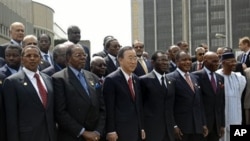This week’s African summit was partly a celebration of shared values, and partly a display of Africa’s growing resentment at what many perceive as values imposed from outside.
This semi-annual summit ended, as always, with words reaffirming the continent’s commitment to democracy, good governance and human rights. The newly-elected AU Chairman, Equatorial Guinea’s President Teodoro Obiang Nguema, spoke in Spanish with an interpreter as he hailed the emergence of a pan-African value system.
"Africa has ratified its confidence in itself and in the shared values as means for establishment of the future progress of the continent and the attainment of a shared vision of unity and integration," Obiang said.
But beyond the words, diplomats and summit observers noted signs of increasing resistance to what many Africans see as pressure to accept standards and institutions created by Western powers.
For the second time in three years, the continental body will be led by a man seen by many in the West as a dictator. Two years ago it was Libya’s Moammar Gadhafi.
Reed Brody of Human Rights Watch says this year’s choice, President Obiang, is in the same category.
"It’s unfortunate for the African Union and for Africans to be represented on the world stage by President Obiang. He took power in a coup 30 years ago, overthrowing his uncle. Since then we’ve had a regime in which human rights are systematically violated, in which torture is widespread, and opposition parties are harassed. It’s not a country that should be held up as a model for the shared values this summit represents."
But when a reporter asked Mr. Obiang at a news conference about his past, AU Commission Chairman Jean Ping interrupted, calling the question improper. Speaking in French through an interpreter, he said no one says anything when other organizations, such as the European Union, choose leaders with questionable backgrounds.
“I’m of the view that you shouldn’t perhaps, how should I put this, be involved in harassment,” Ping said. “You are not being fair, and you have to treat us and place us on the same footing as other organizations. It’s as if you’re applying double standards.”
Several African leaders complained during the summit that western-controlled institutions such as the International Criminal Court had aggravated African disputes, imposing short-sighted or misguided prescriptions for African problems. A common slogan was “African solutions for African problems.”
A summit communiqué strongly backed Kenya’s effort to block ICC prosecutions of those accused of masterminding ethnic violence after the 2007 elections. Leaders expressed annoyance that the U.N. Security Council had denied a previous request for a deferral of the genocide indictment against Sudan’s President Omar Hassan al-Bashir
Chairman Ping lashed out at the international community’s failure to support AU conflict-resolution efforts in places such as Somalia, Sudan and Ivory Coast. He termed international attempts to settle Ivory Coast’s leadership dispute "ill informed and short-sighted," and named a panel of AU heads of state to prescribe a legally-binding African settlement.
But Ivory Coast’s foreign minister in the government of President Laurent Gbagbo seemed to reject the AU panel’s efforts in advance. The minister, Alcide Djedje, said Mr. Gbagbo would only accept the panel’s recommendations if he were allowed to remain in power.
Djedje blamed the Ivory Coast’s crisis on foreign meddling by United Nations Secretary General Ban Ki-moon and former colonial power France.
"Mr. Ban Ki-Moon has no role in the African Union. Several heads of state have given their views, saying they would not accept foreign interference in African issues. Because interference like the one of France is exactly the cause of the situation we’re going through now. It is France that encourages Ban Ki-moon in his attitude and decisions in Cote d’Ivoire," he said.
This summit’s focus on shared values was intended as a show of Africa’s commitment to good governance and human rights, the values of the western donor community. Instead, it revealed an emerging conviction among Africans that their values may not coincide with those of western donors, who are often seen in their eyes not as benefactors but as neo colonialists with less than honorable intentions.




